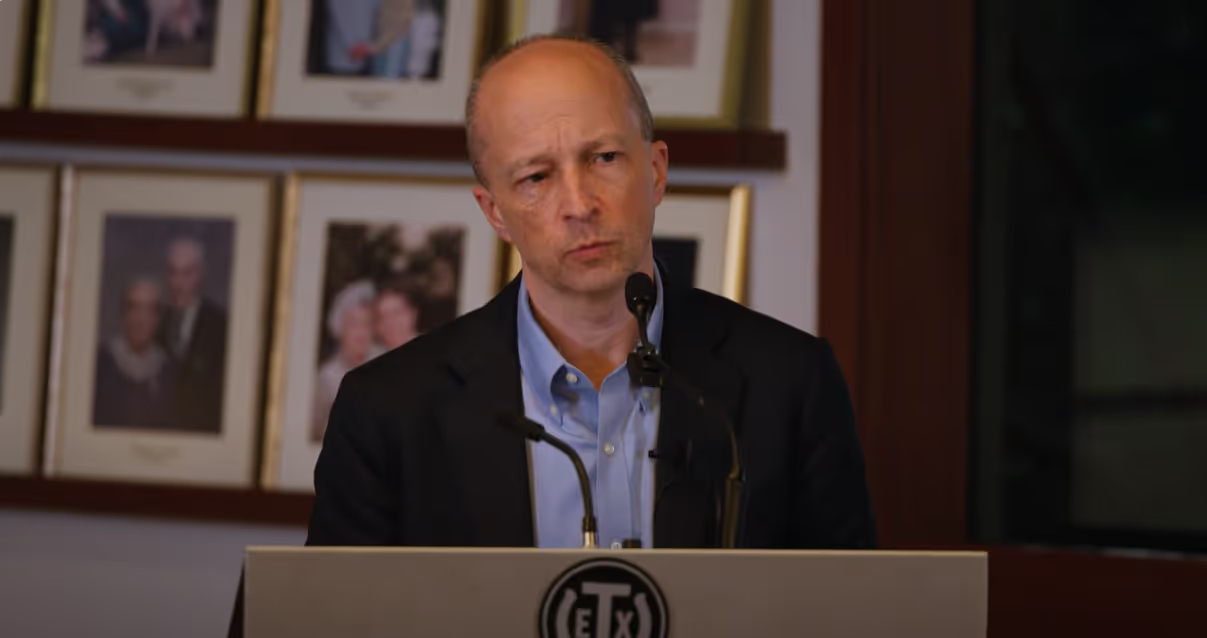
What Game Are We Playing?
The limits in our political tradition aren’t just secondary considerations; they define the very character of civil life.
Prosecuting political enemies; coercing the private sector with expansive civil rights laws; reporting strangers to their employers for misguided speech; attempting to control economic outcomes in the name of social “fairness”; maximizing national power at the expense of the rights of states and localities.
Which side am I describing again?
The vacuousness of the words “right” and “left” as descriptors is now matched by a constitutional emptiness to the “two sides” that dominate politics today. The primary protagonists of national politics in both factions are the “blind, abject admirers of power,” to use Burke’s colorful words from two centuries ago. Not much distinguishes the two in terms of their understanding of how government ought to operate or what political activity is actually about. It now seems to be a basic assumption that politics is about grabbing as much power as possible to try to coerce preconceived social outcomes.
The idea of voluntarily refraining from the exercise of any federal power that might result in some short-term gain is decidedly not in vogue. Republicans have paid enough lip service to “limited government” over the years, though, that they still must occasionally respond to a hectoring gadfly from time to time.
In public debate over such questions, two common tropes keep coming up. Conservatives, centrists, or libertarians uncomfortable with the exercise of some grossly illiberal, unconstitutional, or imprudent act or another will often challenge its defenders along these lines: “It may seem like a good idea now, but wait until the left uses it against you!”
To this, the enthusiasts of power will generally respond something like this: “They’ve already done it against us!” (Or they’ve done something analogous.) Speaking more broadly, you’ll often hear “The rules have changed. You can’t win if you are restrained by a set of limits that your opponent isn’t. The Left has eroded traditional and legal limits on power; we must act accordingly.”
Both talking points have a grain of truth to them — the same grain, actually — namely that “what’s good for the goose is good for the gander.” But both talking points miss the mark — and for the same reason: they treat the rules and limits of political life as if they were simply an ancillary, if not dismissible, set of restraints on the real business of politics. They treat political limits like a “don’t hit below the belt” rule in a fight: the real point here is to beat the living tar out of the other person, but to hedge our bets a bit, we’ll agree to protect some vital interests. In such a situation, if you hit me below the belt, I sure as heck am going to return the favor.
But the limits in our political tradition aren’t just secondary considerations; they define the very character of civil life.
There’s an old joke that Michelangelo, when asked how he created his masterpiece, David, replied, “Easy, I just took a block of marble and chipped away everything that wasn’t David.” A political tradition is something similar. Politics is about power, but power is the marble block. Tinpot dictators and totalitarians remain the model for using the block of power in a blunt and disgusting fashion. Any political tradition that has provided civilized order, prosperity, and freedom for its people must be defined by something more, though. It must be defined by what that power will not be used for.
Perhaps a different metaphor works better.
“The rules have changed!” we hear. But what that comment often ignores is the fact that the rules of a game aren’t just gentlemanly extraneous constraints — they define what game we’re playing.
Imagine you are playing a game of basketball, but gradually the other team starts to play “Calvinball”: they pick up the ball and run with it in both hands; they tackle your team’s players; they declare new rules out of thin air. “It’s a new, progressive form of basketball,” they say, “that keeps up with the times.” Bizarrely, the referees don’t enforce the settled rules, or only do so haphazardly. You would, of course, take your ball and go home. But now imagine you can’t just go home. You are forced to play with these same people all day, every day, for the rest of your life.
On the one hand, it might make sense to start cheating, too. It’s clearly an unfair situation. And if a final buzzer would at some point sound, and the team with the most points would walk off the court with a championship trophy, that might be reasonable. But in this scenario, every game ends with the beginning of a new one. You will be running up and down a court doing something with these people; it’s just a question of what.
In that situation, it would still be incumbent on you to continue to make the case — to the referees, the other team, and the spectators that for now seem entertained by the chaotic spectacle — the value of playing basketball; to show that Calvinball basketball is an utterly self-destructive enterprise, which will very soon leave you without any game to play, and maybe nothing to do at all except beat the living tar out of one another. If you’re convinced that playing basketball as we’ve always known it is the better practice, you can’t just decide to start playing Calvinball yourself. Once you do that, you’ve lost that bigger argument. A game is a set of rules. You can’t change the rules and still be playing the same game.
In modern Western politics, there have generally been at least two contests going on at the same time: one, the day-to-day struggle for power and influence; two, a sort of meta-argument about what we’re actually doing here — what the power and influence are supposed to be for. The grand divisions that are often delineated — conservatives, socialists, liberals, libertarians, progressives etc… — have developed their identities at least in part by offering different answers to that bigger question, and partisan activists have often gained a degree of legitimacy by latching on to one or another label — whether they believed it or not.
Thus, at least throughout the past century, there has been nothing approaching a consensus about what the game of politics is. We can tell that we’re all running around a court with a ball, and we’re supposed to do something with these hoops, but we have no shared sense of what the rules are, and thus, what the game is. The result has been confusion, disorder, and plenty of flagrant fouls.
Many right-wing voices today like to flatter themselves that by throwing more elbows and disregarding more rules, they are doing what the times demand, and finally “fighting back.” But in truth, this new iteration of the right is only possible after complete capitulation on the bigger question at stake. What the times so clearly and palpably demand is the recovery of nomoi — of limits that make our civil life something other than a never-ending brawl.
Nearly fifty years ago, Robert Nisbet described the “sole object of the conservative tradition” as “the protection of the social order and its constitutive groups from the enveloping bureaucracy of the national state.” That is one of the competing notions of what civil politics is supposed to do: it ought to protect the freedom of society and protect the order that emerges from it. And at the core of this belief was the realization that, for all the good intentions one may bring to it, the power of the centralized state almost always disrupts and destroys more than it protects.
A good case can be made that the limits we see baked into the Anglo-American constitutional tradition all gestured toward this general theme. It was a political tradition defined in large part by what government would not do — attempt to systematically direct civil society into conforming to its own unitary vision. When that marble was chipped away, the David beneath was a political-social order that protected both the freedom of individuals and the authority of social institutions to pursue a variety of human goods without central direction. Nisbet and other conservatives recognized full well that such a notion of politics was faltering in the twentieth century, and he saw in his own times that “self-styled conservatives” were increasingly uninterested in the thankless work of defending limits that so many others were transgressing. So, they were giving up the tough fight and instead resting easy in the comforting falsehood that they could get the society they wanted by embracing state power themselves.
This path justifies unlawfulness, power-grabbing, and personal immorality in the name of what they promise will come after the final buzzer. Then, they imagine, one “vision” will win out over the others and impose its own, beautiful order. But social order doesn’t work that way. First, there is no buzzer, no final victory that allows for such transformation. And secondly, the “visions” that various factions hold are not independent of the patterns of behavior we choose for ourselves. Especially in politics, we are what we habitually do. If you decide to play Calvinball, you have become a partisan of Calvinball.
When considering, therefore, whether a president ought to arrest his political opponents, send military troops to American cities against the will of local and state governments, bribe or intimidate private universities and local school districts to accept national “education” standards, send people off American streets to third-world prisons without trial, or impose sweeping taxes under a self-declared “emergency,” the relevant questions ought not to be “what if the other side does it to us?” or “hasn’t the other side already done this?” It is the more pressing question: “Is the game we should be playing?”
John Grove is the editor-in-chief of Law & Liberty.
Constitutionalism

Amicus Brief: Hon. William P. Barr and Hon. Michael B. Mukasey in Support of Petitioners
Former AGs Barr and Mukasey Cite Civitas in a SCOTUS Brief

Rational Judicial Review: Constitutions as Power-sharing Agreements, Secession, and the Problem of Dred Scott
Judicial review and originalism serve as valuable commitment mechanisms to enforce future compliance with a political bargain.

Supreme Court showdown exposes shaky case against birthright citizenship
Supreme Court will hear challenges to Trump's order ending birthright citizenship, testing the 14th Amendment's guarantee for babies born in America.

Why Is the Federal Reserve Special — and Just How Special Is It?
How does the Fed fit into the Court's reform of the administrative state?

Kneecapping Powell, Undermining the Rule of Law
Donald Trump and conservatives know the perils of lawfare all too well. Why subject Jerome Powell to the same thing?


.avif)







.avif)
.avif)


%20(1).webp)


